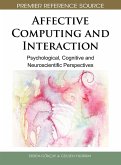Discover the complex world of security psychology with "Internal Paradigm for Affective Responses to Security Information," a ground-breaking book written by Charles Junior. Junior explores the intricate relationship between security knowledge and human emotions in this groundbreaking book, revealing the underlying assumptions that influence how we react to risks and weaknesses. Junior's story goes beyond the bounds of traditional security rhetoric, fusing cutting-edge psychology research with real-world applications in a creative symphony. For security experts, legislators, and researchers alike, each chapter provides priceless insights into the ways in which emotive responses impact decision-making procedures and security outcomes. This book is a monument to the modern world's convergence of psychology and security, not just a book. A new era of security awareness is being ushered in by Junior's thorough study and perceptive analysis, wherein effective risk management and threat mitigation depend heavily on an understanding of human emotions. Embrace the frontiers of security psychology, where Junior's story offers direction in the midst of human behavior's intricacies. Junior's work is a shining example of innovation and advancement in a world where AI technologies find it difficult to understand the subtleties of psychological discourse.
Bitte wählen Sie Ihr Anliegen aus.
Rechnungen
Retourenschein anfordern
Bestellstatus
Storno








